12 employee scheduling apps for your business

When you’re looking through the wide variety of employee scheduling apps available on the market, you can quickly get lost. Which one would be the right one for you? That’s why we’ve compiled this guide of 12 employee scheduling tools to help you make the right decision for your team.
So without further ado, let’s jump right in.
Want to get the most out of your time?
Try DeskTime for free!
Try free for 14 days · No credit card required.
By signing up, you agree to our terms and privacy policy.

Why should you use employee scheduling apps?
Well, the question is not so much about scheduling as such – it’s a no-brainer that employees should know when they are expected to work and for how long. But why bother with a separate employee scheduling app when the good old calendar can get the job done just as well?
While you can, of course, get by with manual scheduling, when your team starts to expand, and you have more needs to take into account, it’s much easier to rely on automated tools that not only reduce the chance of human error in scheduling but also save you valuable time on planning and organizing. Employee scheduling tools typically offer not just a simple calendar where you can enter your team members’ shifts, but they also come with various workforce planning, communication, payroll, and other features that can make you more efficient in areas you may not have even realized you were losing time on.
What are these additional features? Each app on the list has its own unique set of tools in its arsenal, so let’s look at them, and you can decide which would work best for your team.
12 employee scheduling apps to choose from
1. DeskTime
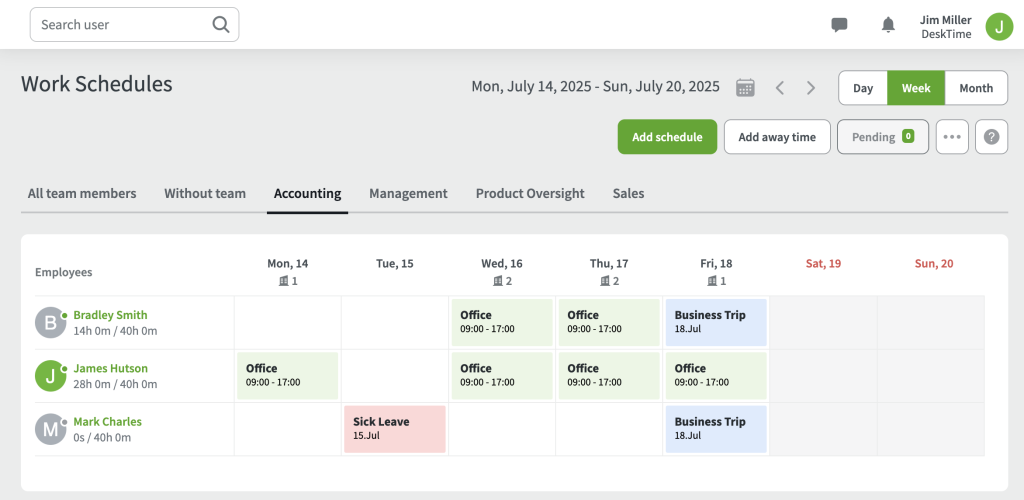
We won’t beat around the bush – we’ll start with our own DeskTime since we think it’s a great staff scheduling app that offers various other time tracking and team management features. DeskTime has a dedicated Shift Scheduling feature that lets you plan your team’s workflow and get a quick overview of who’s working and when by glancing at the calendar. You can indicate whether teammates work at the office or remotely if you offer such an option; you can also mark breaks or absences. That’s because the shift scheduling feature goes hand in hand with the Absence Calendar, which does exactly what it says on the tin – it lets you plan employee absences for whatever reason (vacation, sick days, conferences, business trips, etc.).
In addition to these features, DeskTime offers many other team management solutions that help you organize the workflow and keep an eye on what everyone is doing during work hours. Since DeskTime logs your team members’ arrival and departure times, it also functions as a time clock; once you’ve scheduled everyone’s hours, DeskTime will let you keep track of how they’re being observed. Throw in the productivity analysis, and you can quickly spot your top performers and those needing some assistance.
Additional features: project time tracking, screenshots, break time reminders, and more
Free trial: 14 days
Pricing:
- Pro – $7 per user/month ($6.42 with the annual subscription)
- Premium – $10 per user/month ($9.17 with the annual subscription)
- Enterprise – Custom pricing
2. When I Work
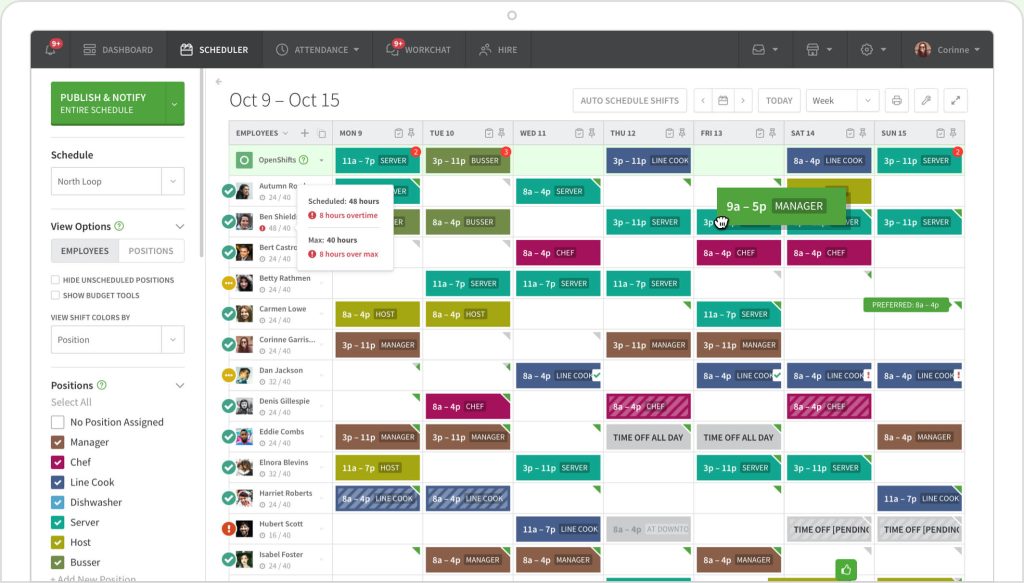
If you’re looking for a dedicated employee scheduling app, one of the options to consider is When I Work. Its primary focus is precisely shift scheduling, with all other features that it offers derived from this one. You can plan your team’s schedule effortlessly, and everyone can quickly see their shifts on the dashboard. Employees can also bid on shifts or, in other words, apply for shifts they would like to be assigned to them; employers then can decide whether or not to approve these requests. There’s also a clock-in system, which will be particularly handy for teams and companies that don’t work in front of their computers – while a system like DeskTime automatically logs your arrival time based on when you’ve turned on the computer, there are many jobs where no computer time is necessary, so other solutions are required.
Additional features: break management, team messaging, reports, and more
Free trial: 14 days
Pricing:
- Standard – starts at $2.50 per user/month
- Advanced – starts at $6.00 per user/month
3. Homebase
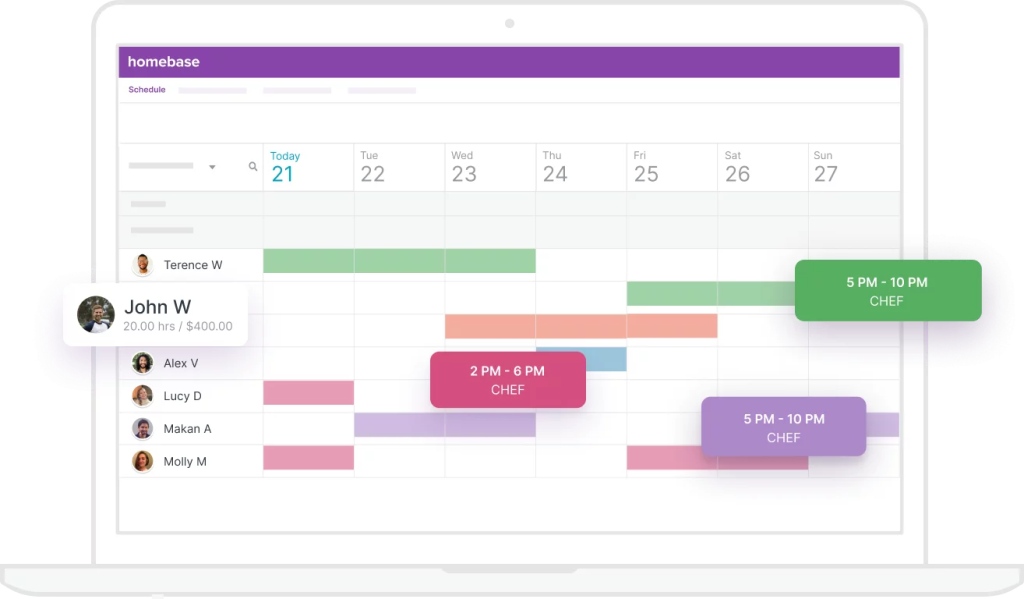
Like When I Work, Homebase is another app particularly suited for companies operating in the service industry and other businesses where work is primarily done on a shift basis. It offers a simple and intuitive shift scheduling system that’s convenient to use from the employer’s and employees’ points of view. Homebase also provides various other team management tools, including payroll, which means that team members can see the wages they’ve earned at any time and even request advances should they need them. With Homebase, you can even track and measure employee happiness – ask them to evaluate how they felt during the shift and look for ways to improve the general mood in the company.
Additional features: hiring and onboarding, in-app messaging system, integrations with 3rd-party accounting, point-of-sale, and other tools
Free trial: 14 days
Pricing:
- Basic – free for 1 location
- Essentials – $24.95 per month/location ($20 with the annual subscription)
- Plus – $59.95 per month/location ($48 with the annual subscription)
- All in one – $99.95 per month/location ($80 with the annual subscription)
4. Humanity
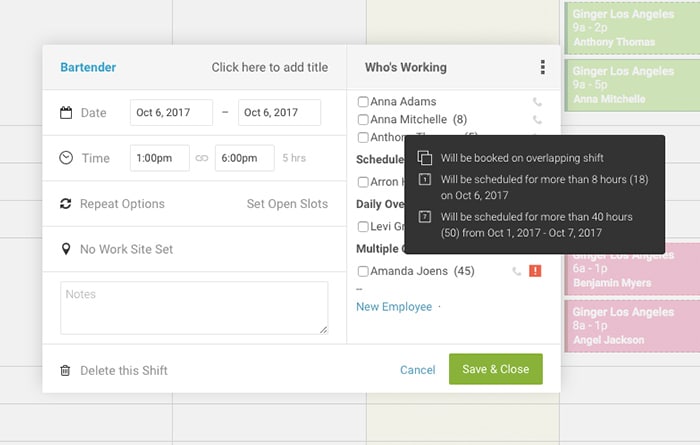
Like several other tools on this list, the primary function offered by Humanity is precisely shift scheduling; however, it comes with all kinds of other features that make scheduling and team management a breeze. Humanity will be a particularly useful tool for industries like healthcare, where it’s essential that a shift is not simply filled by someone but by the right person with the necessary skills and seniority. This employee scheduling app can help you fill those slots automatically without additional administrative work from you. It also offers a workload prediction tool – based on the types and numbers of shifts you’ve been assigning at certain times, Humanity builds a future scheduling forecast, letting you plan better.
Additional features: mobile app (including an Apple Watch app), time clock, scheduling rules to ensure compliance with laws and regulations, and more
Free trial: 30 days
Pricing: available upon request
5. Shiftboard
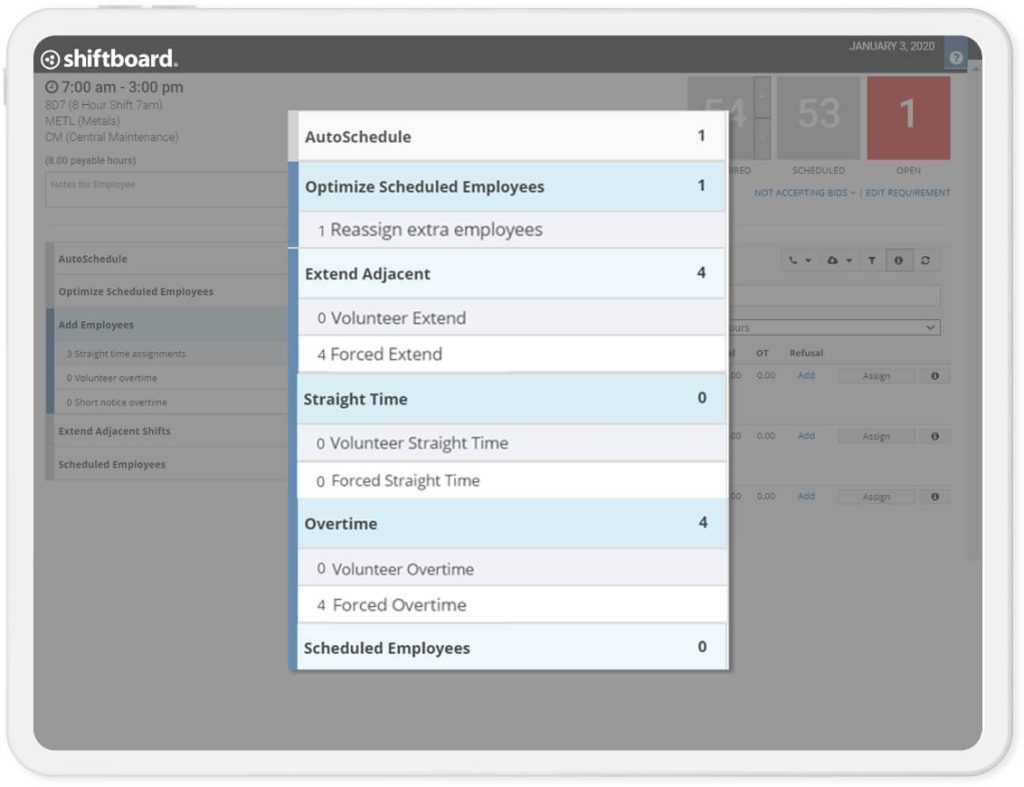
Shiftboard is another team management tool that focuses primarily on shift scheduling, which will be particularly handy for industries like healthcare, retail, and other service-focused jobs. Shiftboard offers loads of customization options, meaning the software can be adjusted to your team’s specific needs and preferences. There’s also an auto-schedule option, which fills in the empty shifts with the most suitable candidates with a single click. Shiftboard, like other tools on the list, offers a reliable notification system that lets everyone know about upcoming shifts or changes in their schedule; you can even set up SMS notifications to bypass any problems with internet coverage.
Additional features: overtime tracking, compliance guarantees, timesheets, and more
Free trial: –
Pricing: available upon request
6. Deputy
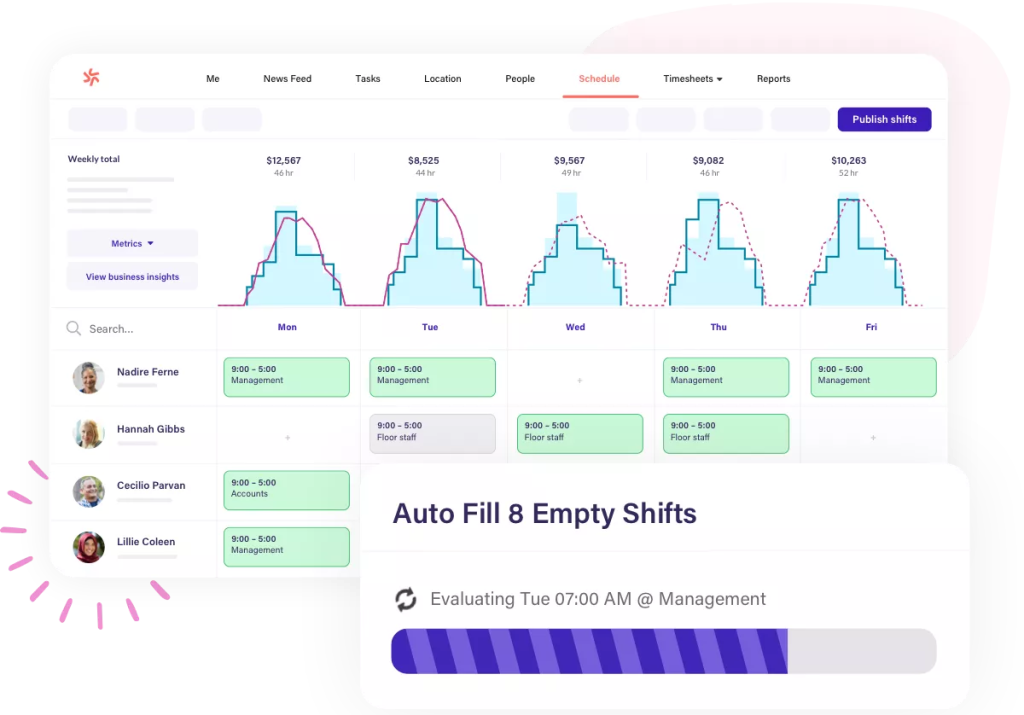
Deputy is another employer- and employee-friendly scheduling app offering all the standard shift scheduling features you’d expect from software like this. One additional feature that makes Deputy stand out among its competitors is that it also has a task management feature in addition to the various shift scheduling possibilities. This means that you can not only assign specific work hours to your team members, but you can indicate the tasks they need to complete during their shifts, too. You can also add any information required to complete the job (like instructions, reminders, etc.). When an employee completes a task, they can mark it as “done” on the app, and you can easily follow along with work progress throughout the day.
Additional features: shift swapping, payroll, HR, and other integrations, employee engagement measurement, and more
Free trial: 31 days
Pricing:
- Scheduling/Time & Attendance plans: $3.50 per user/month
- Premium: $4.90 per user/month ($4.20 with the annual subscription)
- Enterprise: custom pricing

Be smart about your time!
Use DeskTime for shift scheduling and time management and always stay on top of your team’s efficiency ratings.
7. Workforce
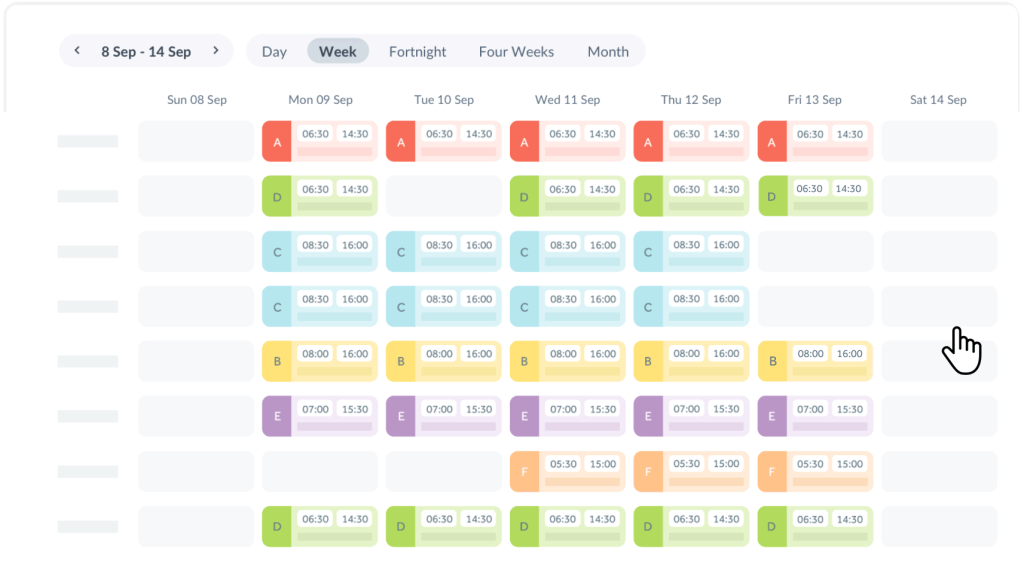
Workforce is an employee scheduling tool that is all about data, data, data. The app uses historical revenue, shift, and even foot traffic data to predict future demand and required staffing. This way, you can optimize your team’s work precisely according to your needs, avoiding over or understaffing. You can also ensure you always have the right people on hand. Suppose someone cancels their shift unexpectedly, and you need to fill in the spot. In that case, you can set up certain criteria (such as skills, certifications, hourly wage, etc.) that employees applying for the additional hours must correspond to. Workforce displays the scheduling and forecast information in detailed charts and reports, so you can always keep track of what’s happening in your company.
Additional features: attendance point system, payroll app integrations, in-app messaging system, and more
Free trial: 14 days
Pricing: available upon request
8. ZoomShift
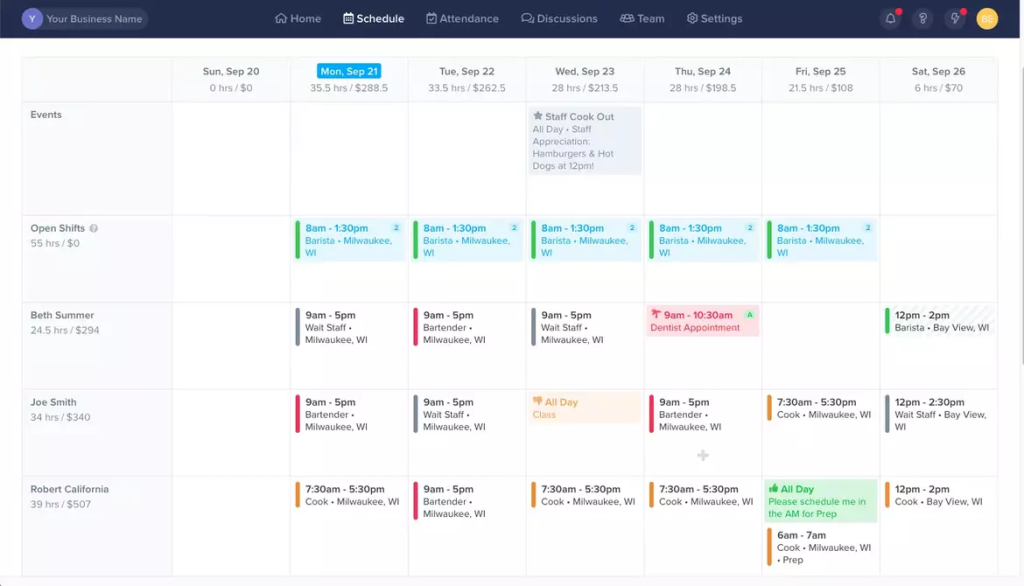
ZoomShift, another tool focusing primarily on shift scheduling and workforce planning solutions, will be a great option to cover all your scheduling-related needs. On top of that, it also comes with other handy features, such as GPS time clock functionality. Planning your team’s schedules is just one part of the job – ensuring they are observed is another. That’s why an employee scheduling app with a built-in time clock option will provide you with even more value. ZoomShift’s GPS-based time clock will log employee location, so you can be confident that when someone’s clocked in for their shift, they’re actually at the site where they’re supposed to be, and there’s no buddy punching going on.
Additional features: shift swapping, mobile apps, timesheets, and more
Free trial: 14 days
Pricing:
- Starter: $2.50 per user/month ($2 with the annual subscription)
- Premium: $5 per user/month ($4 with the annual subscription)
- Enterprise: custom pricing
9. Connecteam
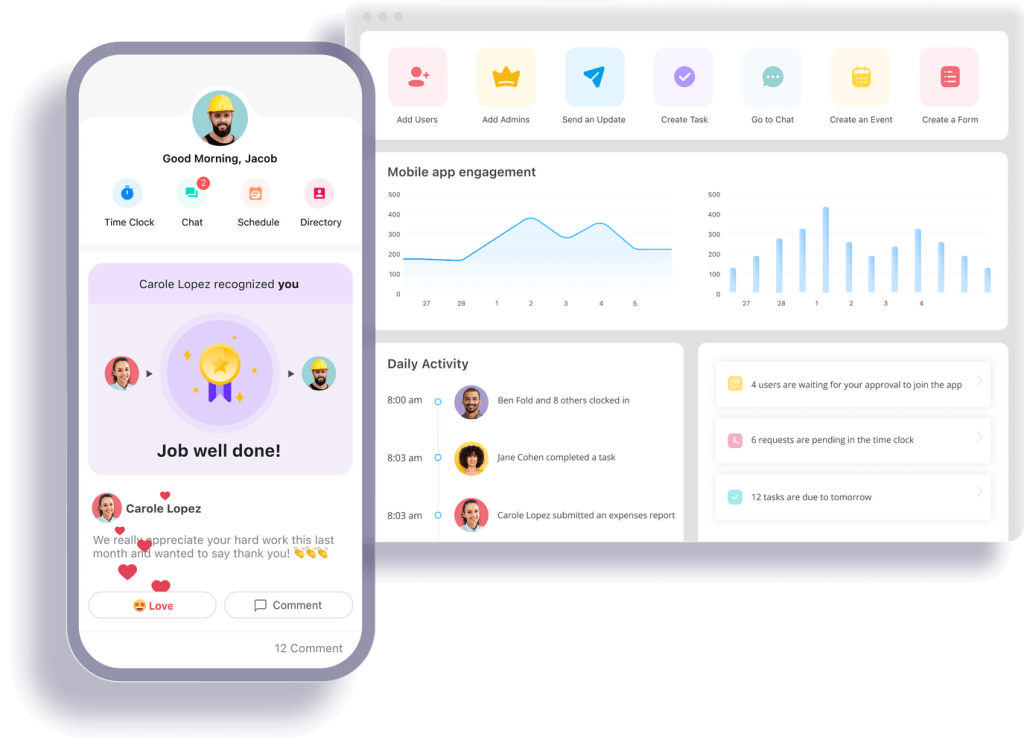
Connecteam is a versatile app that includes various team management solutions, and one of the three main feature hubs (“Operations”) is dedicated precisely to shift scheduling. It offers various shift planning features, including templates, notifications, clock-in and clock-out functionality, and much more. Similar to Deputy, Connecteam also lets you assign specific tasks that employees have to accomplish during their shift; not only that – you can also set up checklists to serve as reminders of tasks that need to be done before employees start working or when they’re ready to clock out. Connecteam’s pricing system also makes it a great employee scheduling app for a small business – its tiers have a fixed price for up to 30 users, so if you have to add a few new employees, you might not incur any additional expenses for a while.
Additional features: kiosk functionality for clocking in/out, timesheets, GPS location tracking, and more
Free trial: 14 days
Pricing:
- Small business: free (up to 10 users)
- Basic: $35/month for first 30 users + $0.6/month for each additional user ($29 + $0.5 with the annual subscription)
- Advanced: $59/month for first 30 users + $1.8/month for each additional user ($49 + $1.5 with the annual subscription)
- Expert: $119/month for first 30 users + $3.6/month for each additional user ($99 + $3 with the annual subscription)
10. 7Shifts
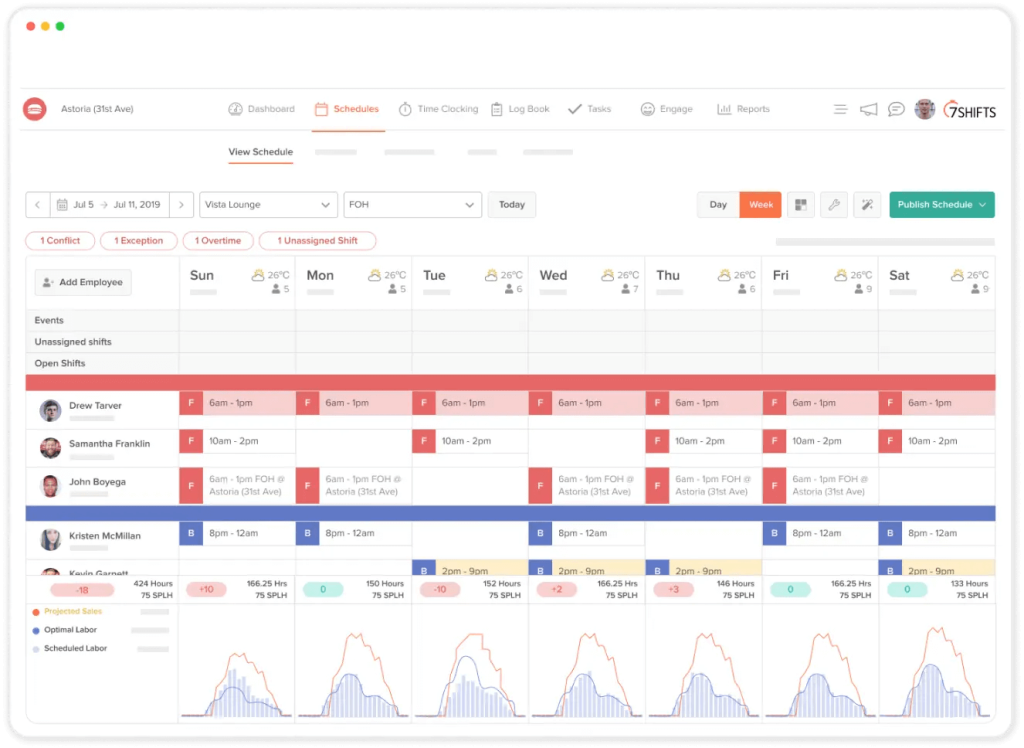
Out of all the apps on this list, 7Shifts was created with one specific target audience in mind: restaurants. The features on offer cater specifically to the restaurant industry (which is also reflected in the names of its pricing plans), so it can help you plan schedules, cover absences, foster communication among your team, and much more – there are even special add-ons to manage tip payout and tip pooling. With a dedicated focus like this, you can also be assured that the support team will be equipped with knowledge about challenges faced by your industry, so their assistance will be as effective as possible.
Additional features: tip tracking, health check questionnaire before clock-in, shift reminders and notes
Free trial: 14 days
Pricing:
- Comp: free for 1 location with up to 30 employees
- Entrée: $34.99/month/location with up to 30 employees ($29.99 with the annual subscription)
- The Works: $76.99/month/location with unlimited employees ($69.99 with the annual subscription)
- Gourmet: $150/month/location with unlimited employees ($135 with the annual subscription)
11. Hubstaff
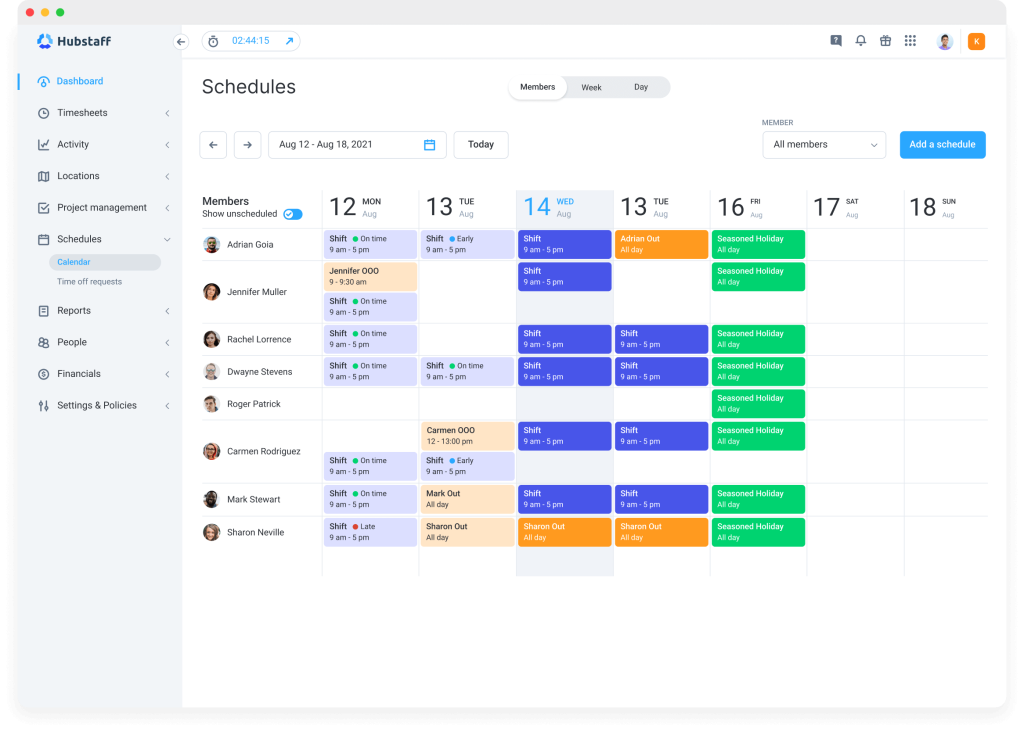
Hubstaff is a frequent guest in these types of blog posts since the range of features this app offers is extensive, and shift scheduling is, of course, among them. Similar to DeskTime, Hubstaff will let you go beyond just scheduling matters. While this basic feature will be very well taken care of, you can also get more in-depth information about how your employees work with its time tracking features. Because at the end of the day, it’s not just about the hours spent at your workplace – it’s the quality of the work and the achieved results that truly matter. Hubstaff can be adjusted for different needs and team specifics, so if you’re looking for a versatile solution that can be adapted to pretty much anything, this will be a great option.
Additional features: geofencing, productivity tracking, payroll tracking, and more
Free trial: 14 days
Pricing:
- Hubstaff Time and Hubstaff Desk:
- Free plan for 1 user only
- Starter – $7 per user/month ($5.83 with the annual subscription)
- Pro – $10 per user/month ($8.33 with the annual subscription)
- Enterprise – custom pricing
- Hubstaff Field:
- Field Pro – $12 per user/month ($10 with the annual subscription)
- Desk Field – $15 per user/month ($12.50 with the annual subscription)
12. Clockify
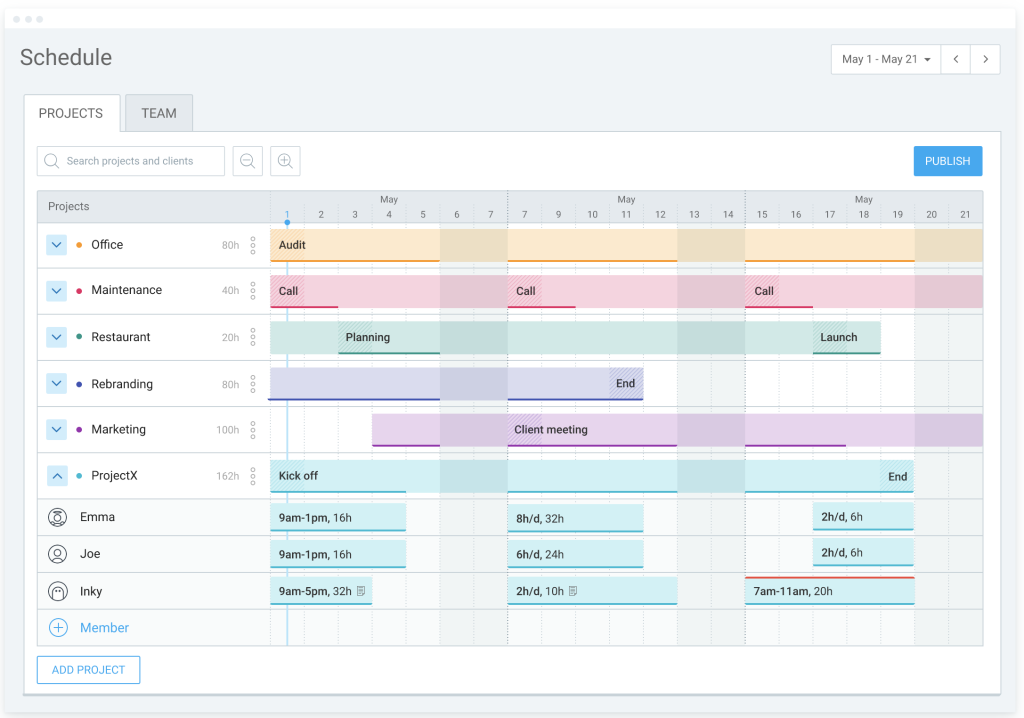
Another option worth considering if you’re looking for a solution beyond shift scheduling is Clockify. Like DeskTime and Hubstaff, it’s a time tracking tool that combines this team management feature with others, including shift planning, since they often go hand in hand. One of the major appeals of Clockify is that it offers a free plan for unlimited users. The functionalities that come with this plan are very restricted, of course, compared to the paid options, but if you’re operating with a very limited budget or just starting your business, they might cover the basic scheduling and time tracking needs for you, which makes Clockify a great employee scheduling app for a small business.
Additional features: kiosk clock-in, GPS tracking, screenshots, and more
Free trial: 7 days
Pricing:
- Free plan for unlimited users
- Basic: $4.99 per user/month ($3.99 with the annual subscription)
- Standard: $6.99 per user/month ($5.49 with the annual subscription)
- Pro: $9.99 per user/month ($7.99 with the annual subscription)
- Enterprise: $14.99 per user/month ($11.99 with the annual subscription)

Some frequently asked questions about employee scheduling apps
What is employee scheduling software?
Employee scheduling software is a planning tool that helps you organize the work in your company; with employee scheduling apps, you can make sure that your business is never understaffed or overstaffed, follow everyone’s workloads, ensure compliance with labor laws, and accomplish much more.
What are the benefits of employee scheduling software?
When using employee scheduling software, you can ensure fair workload distribution among your employees, cut down on administrative work by automating certain scheduling and planning tasks, and ensure your company complies with the local labor laws of the country or countries you operate in. Many employee scheduling apps come with notification, messaging, and task management systems which can help you improve team communication and prevent misunderstandings. As you can see from the examples listed in this article, these scheduling tools typically offer many additional features beyond simple shift scheduling, helping you manage your teams most efficiently.
What is the best employee scheduling app for a small business?
Well, in this case, there isn’t one answer that fits all – it depends on the type of business you run and the field in which you operate. When you’re thinking about employee scheduling apps, the first thing to do is define your needs and wishes for them. There are, for example, apps that cater in particular to specific industries (such as 7Shifts, which focuses on restaurants), others that offer more versatile solutions (such as Hubstaff), and apps that will work the best for employees working in front of their computers (such as DeskTime, which also lets you measure employee productivity and effectiveness). Don’t hesitate to take advantage of the free trials that most of these apps offer – test them, see what they can do for you, and make informed decisions that fit your business needs and are at the right price point for you.
In conclusion
Finding the right employee scheduling app can be overwhelming, given the variety of options available on the market. However, it’s worth investing some time in finding the right tool for you because, in the long run, scheduling apps can make workforce planning a smoother process, saving time and reducing human error. Hopefully, with the help of this guide, you’ll be able to choose the best app for your team.
Did you find this article useful? Give it a clap!
Psst! You can clap more than once if you really loved it 🙂